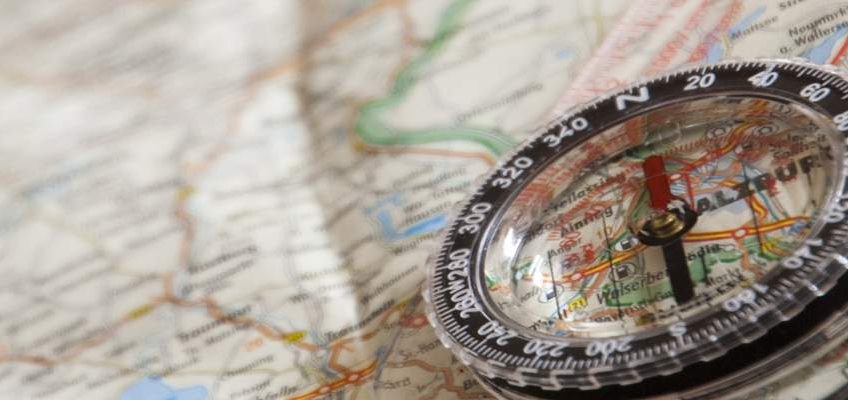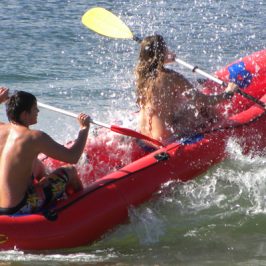Maps are beautiful. In fact, to me, they are much more beautiful than the few square inches of a smart phone.
There is something about placing a compass on a paper map, looking around and discovery the joys of finding your place on Earth on a two dimensional miniature representation of the landscape all around. This is something that is almost impossible using a phone or a GPS device, which is limited to a maximum of a few square yards.
Yet, with technology invading our lives at a relentless pace, we are slowly but surely losing our touch with the basics of life and living. Sure, there is an intrinsic value in pressing a few buttons and being told where one is and in which direction to head. Consequently, we are becoming so dependent on these tools that we are gradually losing the power to think for ourselves. We have abdicated our thinking powers to gadgets and gizmos. God forbid, if we are ever caught in a situation where we need to do our own thinking, we will be like the proverbial fish out of water. Chances are that we will be caught without a map and compass, and that will make life exceedingly difficult and frustrating.
There are inherent drawbacks of using a phone or a GPS device to navigate. Let us look at some of them.
1. Technology is limited to a few square yards
After all there is only so much information that is comprehensible within a few square inches. If we want to know our location, we will have to zoom in to the icon thereby losing anything that the surrounding terrain has to offer in terms of information. When we zoom out of the screen, we lose perspective of where we are even though we can see a lot more stuff on the screen. But despite a larger geography that is viewable, details become entirely lost. When we zoom out to see a larger area, the creek that can offer guidance vanishes from the screen, the knoll or hilltop is never demarcated through contour lines, roads and streams merge into one.
2. Maps provide a larger perspective
A map, particularly one that is around a 1:25,000 scale will provide a lot of information regarding where you are and the surrounding area covering hundreds of square kilometres. One can easily identify features, elevations, contours, streams, tracks, buildings, vegetation, etc. The better the map, the ore the information, but even a basic map will provide a lot more information at a glance than a digital map displayed on a cell phone screen.
3. Maps never run out of battery
One of the scourges of modern life is our dependence on electricity. Any technological gadget that we might be carrying for navigation will require a power source, most likely batteries. No one think of getting lost and hence the supply of spare batteries being carried is largely limited. When the batteries on the gadget dies out, one is left with virtually no means of knowing what to do next.
4. Maps do not short out when wet
In case it is pouring cats and dogs, many electronic gadgets will stop functioning, either because you are protecting it from the rain or because it got wet and shorted out. Not so with a paper map. Many maps come pre-laminated or you have put it inside a waterproof map case. Even orienteering compasses are waterproof. Place the compass on a map even in pouring rain and bingo, you are good to go.
5. Maps do not depend on GSM signals
If you are depending entirely on your cell phone to guide your hike through the wilderness, you better make sure that you stay close to areas of network connectivity. You do not want a "no signal" message or a "emergency calls only" message flashing on your screen. This fact will limit your geography of exploration. And if Murphy has any credibility, the time you will really need to see a map to guide you home, will be the time when you are outside network coverage. Not so with maps. With the proper map, you know where you are pretty much anywhere on the surface of this Earth. Of course, the map needs to be of the area you are venturing into.
6. Maps take you closer to Nature
When you are orienting yourself with a map, you know where you are. You look at the map and find the feature on the ground. You realise things around that particular feature. "Ah ha, there's the summit and there's the stream flowing from east to west. Did not realise there is a trail going into the woods," are things you will be discovering when you superimpose the map onto a physical environment. You can almost never do that on a GPS or a phone screen.
7. Technology can misdirect you
Depending on the status of the software or the interference from its surroundings, the gizmo can well lead you up the garden path, in an entirely wrong direction. I was once travelling to Manali and was carrying an old GPS device. It showed an elevation of some hundred feet, when I was actually a few thousand feet high. I had a back up device and saved myself a lot of trouble. A map is dumb and does not think for itself ... it leaves that to the user. It is merely a guide that needs to be interpreted. We become so dependent on modern gadgets that it takes us a long while to realise that it could be wrong ... and by then it might be too late.
We need to reduce our dependence on modern gadgets.
They are extremely useful instruments, don't get me wrong. But they do not and should not replace our individual ability to think and arrive at our own decisions. Let us not become dumb followers of an electronic voice guided system that has been programmed to behave in a certain manner, given a certain set of parameters. Change the parameters and the information becomes questionable.
It is imperative that we do not lose the knowledge that has sustained humanity for thousands of years. Whether it be the knowledge of map reading or celestial navigation or knowing how to use a sextant or knowing how to find our coordinates using the stars or telling the time using the shadow of the Sun. These nuggets are what that has sustained humanity for thousands of years and it is very unfortunate that with the "advances" in science and technology, we are slowly becoming zombies obeying orders from unknown and often unreliable pieces of gadgetry.
Can we get to a stage where every kid in School is taught map reading, Morse Code, celestial navigation, first aid, etc? If we do not, the knowledge that has been nurtured for so long will soon be consigned to the Museum of History and soon after that will cease to exist altogether.









